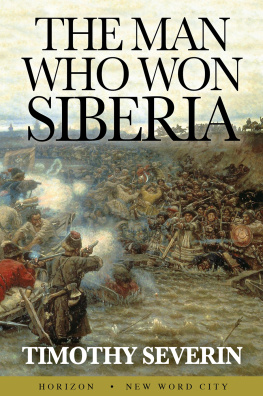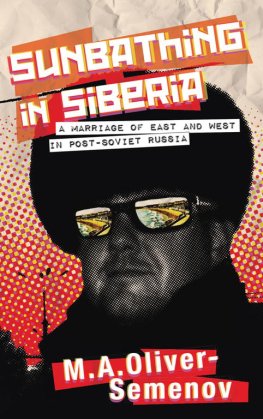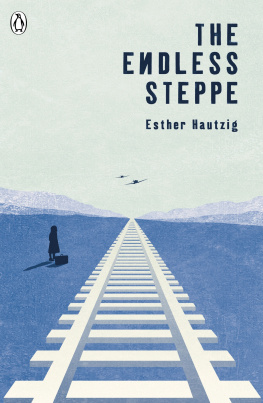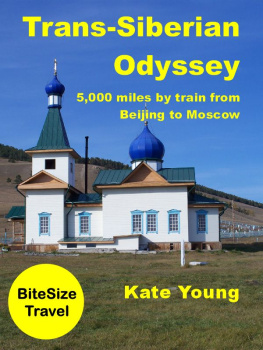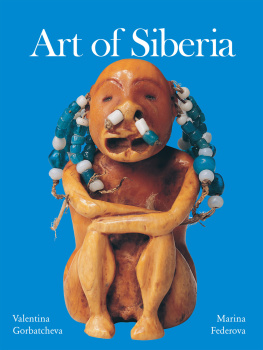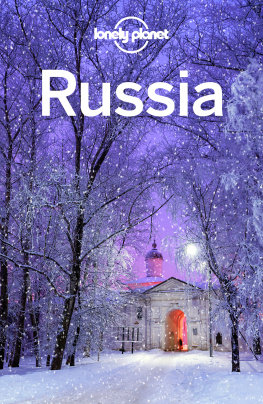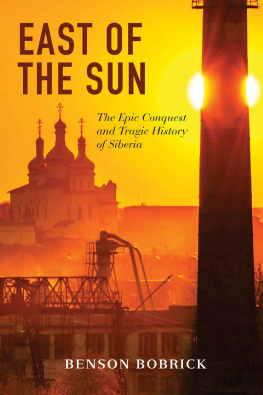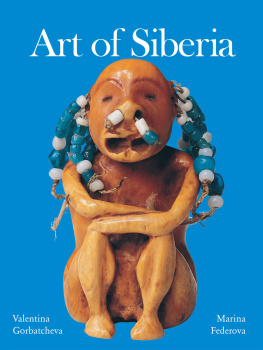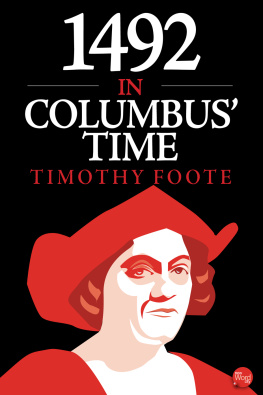Ermak - The Man Who Won Siberia
Here you can read online Ermak - The Man Who Won Siberia full text of the book (entire story) in english for free. Download pdf and epub, get meaning, cover and reviews about this ebook. City: Russia;Russia (Federation);Siberia;Siberia (Russia, year: 2014, publisher: New Word City, Inc., genre: Art. Description of the work, (preface) as well as reviews are available. Best literature library LitArk.com created for fans of good reading and offers a wide selection of genres:
Romance novel
Science fiction
Adventure
Detective
Science
History
Home and family
Prose
Art
Politics
Computer
Non-fiction
Religion
Business
Children
Humor
Choose a favorite category and find really read worthwhile books. Enjoy immersion in the world of imagination, feel the emotions of the characters or learn something new for yourself, make an fascinating discovery.
- Book:The Man Who Won Siberia
- Author:
- Publisher:New Word City, Inc.
- Genre:
- Year:2014
- City:Russia;Russia (Federation);Siberia;Siberia (Russia
- Rating:5 / 5
- Favourites:Add to favourites
- Your mark:
- 100
- 1
- 2
- 3
- 4
- 5
The Man Who Won Siberia: summary, description and annotation
We offer to read an annotation, description, summary or preface (depends on what the author of the book "The Man Who Won Siberia" wrote himself). If you haven't found the necessary information about the book — write in the comments, we will try to find it.
The vast lands and wealth of Siberia were claimed for Russia in the sixteenth century by a renegade soldier named Yermak Timofeyevich, an explorer whose accomplishments rival those of Columbus, Cook, and Magellan. Here, in this short-form book from award-winning author Timothy Severin, is his incredible and seldom-told story.
The Man Who Won Siberia — read online for free the complete book (whole text) full work
Below is the text of the book, divided by pages. System saving the place of the last page read, allows you to conveniently read the book "The Man Who Won Siberia" online for free, without having to search again every time where you left off. Put a bookmark, and you can go to the page where you finished reading at any time.
Font size:
Interval:
Bookmark:
The greatest European explorer the world has ever known may not have been Christopher Columbus , James Cook , Hernando Cortes , Ferdinand Magellan , or Francisco Pizarro . If explorers are evaluated by the size of the regions they won for their countries and how long their nations managed to hold those territories, then the most successful European explorer in history was sixteenth-century adventurer Yermak Timofeyevich. It was Yermak who made Russia an oriental power, changing the map of Asia. His explorations beyond the Ural Mountains started a chain of events that added one-tenth of the worlds land surface to the Russian empire.
When Yermak set out, Russia was only a collection of principalities and conquered territories just beginning to call the prince of Moscow their czar. In only eighty years, he and his successors explored and staked claim to that vast third of Asia we call Siberia and carried the Russian flag 3,000 miles from the Urals to the Pacific. The opening of Siberia was the largest and most enduring land grab ever made by Europeans, an exploration as aggressive and self-confident as any in the New World. Yet, because the barely literate Russian explorers failed to make and hand down a detailed record of their deeds, Yermak has been scarcely noticed in the annals of discovery.
The characters in this extraordinary story are compelling. In Moscow ruled the aging and half-mad Ivan the Terrible , worn out by nearly a century of despotism, distrustful and still threatened by a treacherous nobility within and foreign rivals without. Six months journey to the east lived Kuchum Khan , the blind ruler of Siberia, who, like the czar, had come to his throne in a welter of dynastic murder and who dreamed that the mantle of Genghis Khan had fallen upon his shoulders. Between the czar and the khan appeared in 1577 the mysterious figure of Yermak, with a host of warriors at his back.
Where Yermak came from no one has ever been sure. Tradition has it that his grandfather was a renegade serf, a coachman from Suzdal , near Moscow, who ran away to join the Cossacks of the lower Volga . The name Cossack, from the Russian Kazak of Turco- Tatar origin, meaning freebooter, sometimes referred to the vigilantes who defended southern Russian frontier towns; at other times, it referred to bands of Tatar irregular cavalry who hired themselves out as mercenaries to larger state armies. In Yermaks case, it probably referred to the independent communities of free Cossacks who lived in the Crimea and on the banks of the Don and the Volga. Those who had not been born Cossack were mostly runaways like Yermaks grandfather - from Russian service, from the Tatar tribes, from the law, or even from the slave benches of Turkish galleys. The free Cossacks spoke Russian spiced with Turkish and Mongol words and often changed their names to break all ties with the past (Yermaks given name had been Vasili). They lived in loose military-style communes called hosts, recognizing no master but their own elected leaders, or atamans. They earned their keep by trade, mercenary hire, and protection money from the caravans.
In the summer of 1577, Ivan lost his patience with the free Cossacks. As mercenaries, they had previously been useful to him, but now they were openly attacking Russian settlements and plundering Russian traders. They had even molested a Russian ambassador on his way to address the shah of Persia . When the czar sent an army of his new professional soldiers, the Streltsy , against the Cossacks, they promptly scattered like wolves, it was said. One band of about 500 men, who had been making a fat living as highwaymen on the Volga, beat a hasty retreat up the Kama River and suddenly reappeared in Russias easternmost frontier province under their ataman, Yermak.
This area of the Russian frontier was held by the powerful merchant family, the Stroganovs . Rich and successful pioneers, the Stroganovs leased vast tracts of frontier land from the crown until their fief grew to be a state within a state. They built their own towns, imported their own laborers, held their own law courts, and raised their own troops, for whom they manufactured their own cannon. Immensely experienced in frontier ways, the Stroganovs knew that attempting to settle a Cossack host was akin to taming a wolf: Sooner or later, 500 heavily armed Cossacks were likely to revert to their old vices. So, after briefly employing Yermak and his men as guards, the Stroganovs offered to supply and equip them if they would march across the Urals into unknown territory.
The idea for an eastern expedition may have been suggested by Yermak himself, eager to plunder virgin lands, or it may have come from the czar, as a test of the strength of Kuchum Khan. But it is more likely that the Stroganovs proposed the expedition as a way to rid themselves of their unwelcome guests. Whoever devised the plan, it was readily accepted, and in July 1579, Yermak and 540 Cossacks, reinforced by 300 Stroganov soldiers, set out across the mountains with the figures of Russian saints embroidered on their war banners, which they promised to raise against the pagan Siberian tribes and the dominant Moslem Tatars of the khanate, the territory ruled by the khan.
The Urals represented the limit of habitable Christian land and the official frontier of Europe. Only a handful of fur traders had penetrated the mountains, and they spoke of the native Siberian Samoyeds as self-eaters, claiming they turned cannibal and ate one another to sustain life in winter. If a visitor arrived in their camp, it was said they either devoured him or, eager to please, slaughtered their own children and served them up as a banquet. What the Cossacks were to find, in fact, was a group of tribes that kept slaves, scalped their enemies, and in their funeral rites, strangled reindeer over the grave.
Kuchum, khan of Siberia, was a steppe warlord in the old Mongol tradition, the battle-tried leader of a people who had terrorized Russia for 200 years and who had more than once sacked Moscow itself. The Tatars were trained to the saddle and accustomed to harsh nomadic ways. They lived cheek by jowl with their cattle and dwelt in smoke-filled tents of felt-covered lattice with no more possessions than their rugs and skins, a few sacks of provisions, and their weapons.
These cavalrymen were the main enemy Yermaks Cossacks and soldiers would have to face, and the Cossacks had long ago copied their military structure. As senior ataman, Yermak was in command of the expedition. Beneath him were two other atamans, Ivan Koltso and Ivan Grossa, and under them four esauly, or captains. The rank and file were organized into sotnias, or companies, of a hundred or so men, each with its own sotnik, or commander. There were further subdivisions of fifty each led by petty officers.
Controlling the unruly free Cossacks was complicated by the fact that some of the Stroganov soldiers were Lithuanian and German prisoners of war seized by the czar and later redeemed as laborers by the Stroganovs. These foreigners, together with a smattering of Tatar renegades, made the expedition a very mixed force. Yermak maintained discipline by the traditional Cossack method: Anyone who disobeyed his orders was tied in a sack weighted with sand and drowned.
For weapons, Yermaks men carried old-fashioned flintlock muskets, pikes, swords, battle-axes, and bows and arrows. Three small cannon were part of their original armament, but these were too heavy to drag across the mountains and were abandoned. Each Cossack had with him only three pounds of powder and three pounds of lead, together with his primary food supply of rye flour, oats, salt, biscuit, butter, and - for every two men - half a salted pigs carcass.
The expedition headed up the Serebryanka River to the mountains. The going was slow because the Cossacks had to manhandle their craft over the shallows, and Yermak was relying on native guides in a territory where the Cossacks reputation for ferocity had preceded them. One Cossack patrol was mauled by a war band of Mansi , one of the local tribes. Yermak and his men were clambering up the western slopes of the Urals when cold weather caught them, and they were forced to build their winter camp and settle in.
Next pageFont size:
Interval:
Bookmark:
Similar books «The Man Who Won Siberia»
Look at similar books to The Man Who Won Siberia. We have selected literature similar in name and meaning in the hope of providing readers with more options to find new, interesting, not yet read works.
Discussion, reviews of the book The Man Who Won Siberia and just readers' own opinions. Leave your comments, write what you think about the work, its meaning or the main characters. Specify what exactly you liked and what you didn't like, and why you think so.

